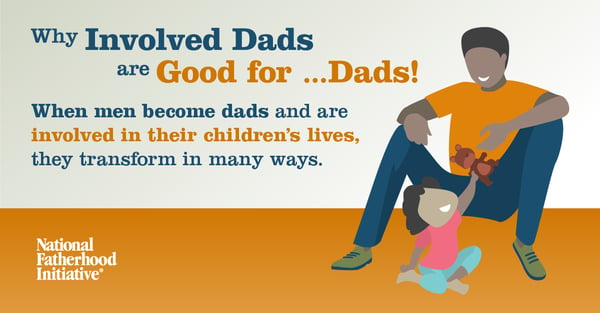How Fatherhood Improves Men’s Well-Being
2 min read
Date Published: 10/24/2023
Last Updated: 11/22/2024
National Fatherhood Initiative Blog / Latest Articles
2 min read

When my wife confirmed she was pregnant with our first child, I experienced the joy of learning that wonderful news.
Eventually, though, my thoughts gravitated to wondering what impact being a father would have on me. I wondered, “How will this gift change my life?” The year was 1994. There wasn’t a source of information and resources for expectant dads on what to expect from and how to prepare for the most important role of my life.
Ironically, that was the same year National Fatherhood Initiative® (NFI) was founded. Nearly three decades removed from that life-changing moment, I’ve had the honor to work with an outstanding group of people to help our partners across the country provide the evidence-based and evidence-informed information and resources that help expectant dads prepare for and succeed in raising their children.
One of the ways in which NFI prepares men for fatherhood is to help them understand the benefits that fatherhood brings to men’s well-being. A recent study of more than 18,000 parents, for example, compared the well-being of fathers to men who aren’t fathers and the impact of becoming a parent on dads and moms. The researchers discovered that dads had:
But here’s the rub with research. It’s just, well, research. What makes research most helpful is when it’s used to create practical tools that effect positive change.
That’s one of the things NFI does well. A great example is Why Involved Dads are Good for…Dads!, the latest addition to our line of free strengths-based infographics that organizations like yours can share with dads, moms, and others in your community. This infographic highlights all the ways in which men benefit physically and mentally when they become a dad and when they’re involved in their children’s lives.
Speaking of mental health, fatherhood comes with challenges as well as benefits. One of the answers to my question about the impact fatherhood would have on me was another question: How would I handle this awesome responsibility? Especially in the absence of a good role model for a father. Would I struggle to handle it from a mental and emotional perspective?
I have no doubt that if you serve expectant and new dads, many of them have wondered the same thing. Fortunately, NFI has a new resource to help those dads that’s been flying out of our warehouse: Three Steps for Dads to Take Care of Their Mental Health. This new brochure helps expectant, new, and, frankly, all kinds of dads learn practical steps to care for their mental health and resources to help them take those steps. (Learn more about it and all of its uses here.)
Fortunately, NFI isn’t the only resource for information and tools on dads’ mental health. A case in point is the National Responsible Fatherhood Clearinghouse (NRFC). I learned recently about the NRFC’s list of resources on dads’ mental health. I encourage you to download it and see whether any of the resources can help the dads you serve.
Do you share resources with dads on how to care for their mental health?
How much would the fathering of the dads you serve improve with better mental health?
Date Published: 10/24/2023
Last Updated: 11/22/2024
Download the ebook to learn how to create fatherhood initiatives that engage every sector of community life.

Train Your Staff
Fatherhood Programs
Fatherhood Data
© 2025 National Fatherhood Initiative®. All rights reserved.